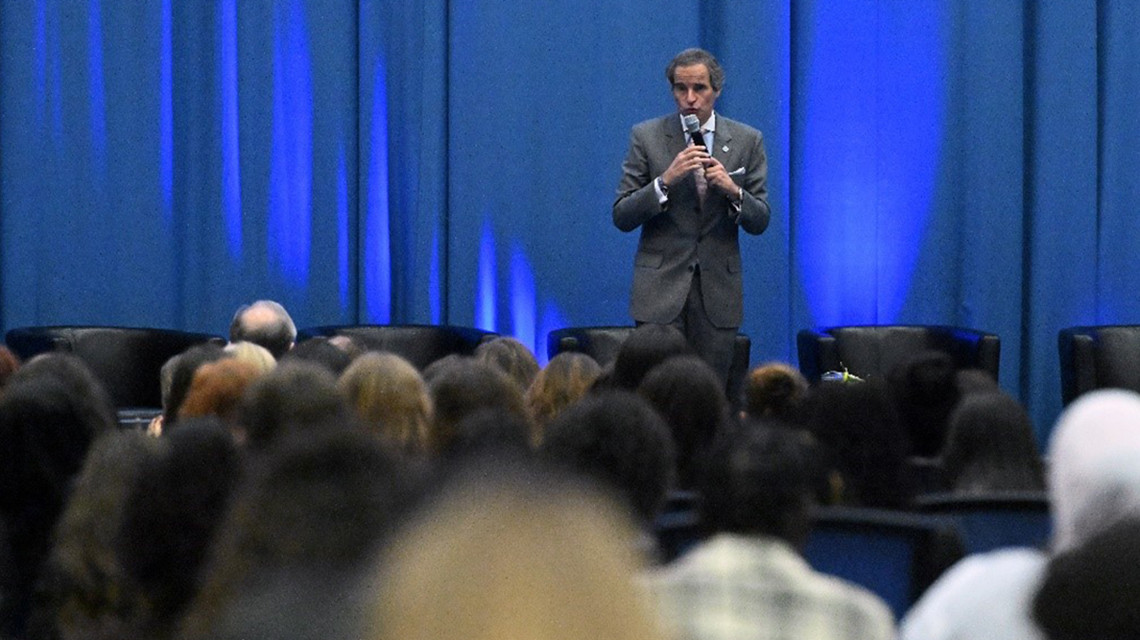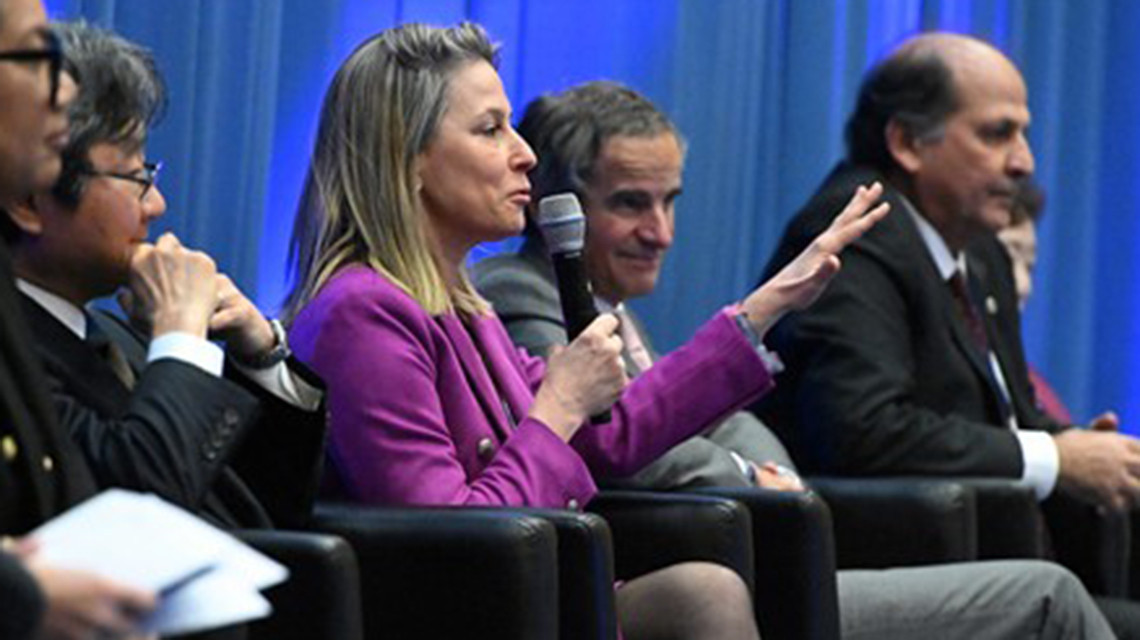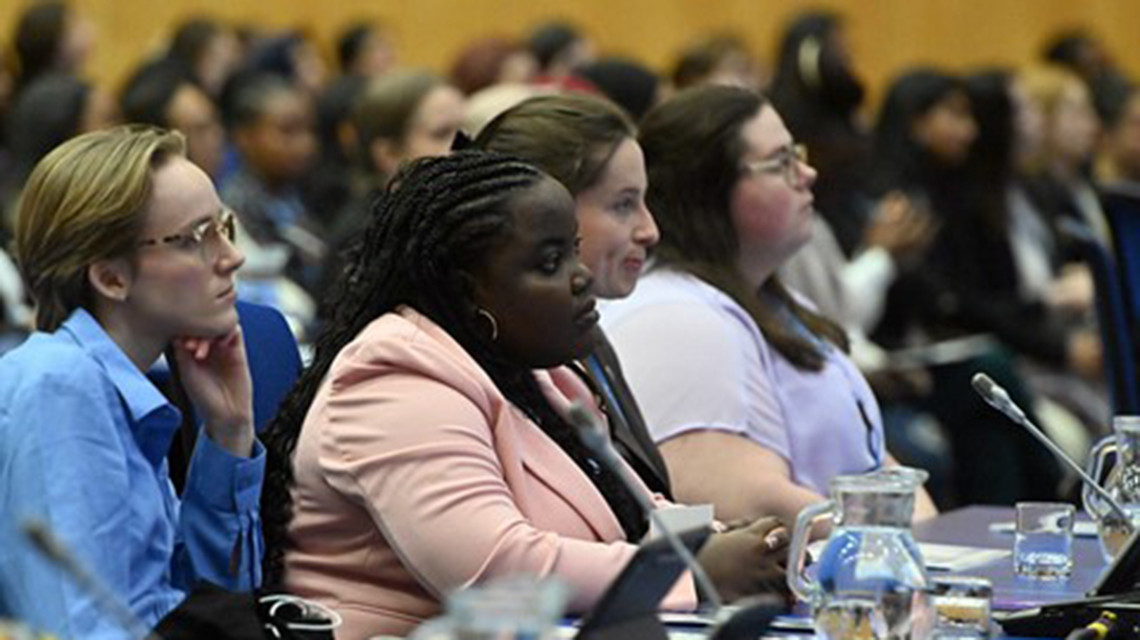Over 400 women, current and future nuclear professionals, gathered at the IAEA headquarters in Vienna for dynamic talks and interactions with senior nuclear experts, industry and recruitment agencies. Over the two days filled with panels discussions, presentations and career talks, the IAEA Marie Skłodowska-Curie Fellowship Programme (MSCFP) students and alumnae, and Lise Meitner Programme (LMP) participants from more than 100 countries, also exchanged their experiences and aspirations, forming a strong community of women in the nuclear field. Livestreamed sessions can be accessed here.
The IAEA event, entitled For More Women in Nuclear, took place from 7 to 8 March in commemoration of International Women's Day. It was opened by IAEA Director General Rafael Mariano Grossi who urged other organizations and members of the nuclear industry to address the gender disparity of women in the nuclear sector.
"The real problem is the imbalance of the presence of women in the professional world, and of course more imbalance when it comes to nuclear and STEM related professions," Mr Grossi said.
"We need you. The world needs nuclear, and nuclear needs women," he said.

Under Mr Grossi's helm, the number of women in professionals and higher categories at the IAEA secretariat has increased from 30 per cent to almost 46 per cent since December 2019.
The high-level panel discussed how the international community can work toward breaking down barriers to better support the current and next women leaders in the nuclear sector.
"Women need to be given the opportunity to actually see what is there for them in nuclear," said Sama Bilbao Y Leon, one of the panellists and the Director General of the World Nuclear Association (WNA).

Sama Bilbao Y Leon, Director General of the World Nuclear Association, speaking to participants during the high-level panel at the opening of the event.
Career talks in breakout sessions focused on strengthening participants' networks and leadership skills, as well as how the nuclear community can support women throughout their careers in the field. Senior nuclear experts and leaders shared their experiences and answered questions. Industry professionals had the chance to meet with a growing community of women nuclear experts and explore opportunities to advance their careers.
"Be bold," said Aleshia Duncan, Deputy Assistant Secretary of the Department of Energy in the USA. "Make an impression. Make a connection. Make a network and a tribe of people that will support you throughout your career.
"We're telling the truth when we say we need you, but we need you to show up as your best self, knowing that you can do the job, knowing that you can bring your whole self, knowing that you can be who you are, and do the job."
"The organizations I worked for took it upon themselves to change the way they recruited, nurtured talent, promoted people, and they changed the policy that they had adopted, until that point, to attract women and to look like the society that they were part of and served," said Mina Golshan, the Safety, Security and Assurance Director of Sizewell C Ltd., during a session featuring leading organizations in the nuclear industry.
During the event's closing session, the IAEA and WNA signed an agreement pledging to work together to help place women in more professional positions in the nuclear sector. Participants of both programmes also presented their joint statement acknowledging how crucial it is to champion and empower women in nuclear science and technology, and that the field must become more accessible to women. The joint statement was an outcome of an innovative synchronous collaborative online methodology allowing them to democratically write and edit together their vision of how to attract and retain more women in the nuclear field before the event. Their joint statement pledged to support, advocate, promote and practice policies that empower women, ensure gender equality, and enable women to reach their full potential in the nuclear field.
The IAEA event also showcased the achievements of the MSCFP and LMP programmes and provided a platform to not only strengthen existing partnerships with donors, but also to establish new ones, ensuring the continued sustainability and success of both programmes for years to come.
High-level representatives of IAEA's major donors shared their motivations to support the IAEA on the two programmes, as well as concrete actions and outcomes achieved, and what is envisaged for the future of women in the nuclear sector. Mr Carl Hallergard, European Union Ambassador and Permanent Representative to IAEA, announced the EU's pledge to contribute a further 2 million euros to the MSCFP for future cohorts. The EU is currently the largest MSCFP donor.
The event was made possible thanks to the generous support of China, Japan, the Republic of Korea, the Russian Federation, the UK and the USA, as well as Walter Testo and Urenco.
Since the MSCFP flagship programme was launched in 2020, 560 women from 121 countries have received financial in-kind support to pursue degrees in the nuclear field in over 70 countries worldwide. Over 180 have already completed their master's programme with the support of the MSCFP, and over 100 of the selected students have been confirmed for an internship facilitated by the IAEA. The MSCFP welcomed its largest cohort to date at the end of 2023 when over 200 new students were awarded to pursue their studies in nuclear subjects.
"On this International Women's Day, let us reform our support and commit to empowering women in nuclear science and technology," said Zainab Kamara, a MSCFP recipient from Sierra Leone who studied Nuclear Science and Applications in the UK.

Participants of the IAEA Marie Skłodowska-Curie Fellowship and Lise Meitner Programmes during the high-level panel discussion at the opening of the IAEA "For More Women in Nuclear" event.
Since its launch in 2023, the LMP has provided early- and mid‑career women professionals an opportunity to participate in a multiweek, visiting professional programme to advance technical and soft skills at host institutions around the world. The programme was hosted last year by North Carolina State University, as well as Oak Ridge National Lab and Idaho National Lab in the United States of America. The next LMP cohort will focus on nuclear power and is expected to take place from 25 March to 5 April 2024 in the Republic of Korea.
During the panel dedicated to donors' impact on both programmes, Minister Nobuharu Imanishi of the Permanent Mission of Japan to the IAEA announced Japan's agreement to host future LMP cohorts.






